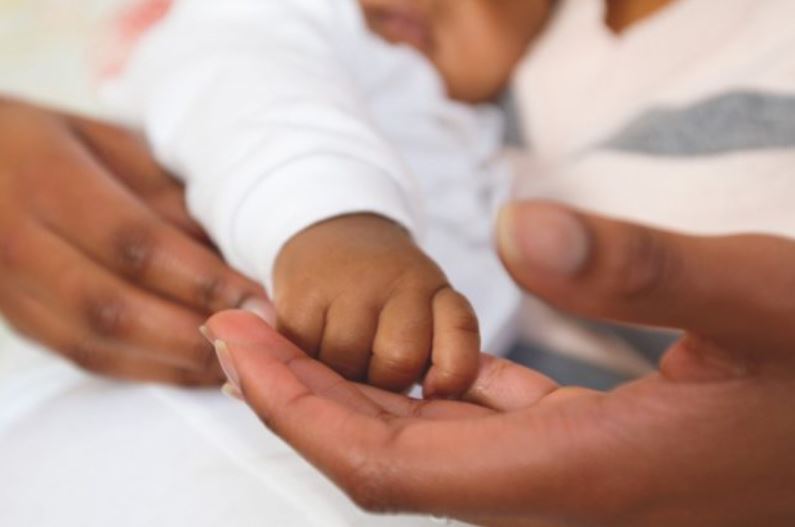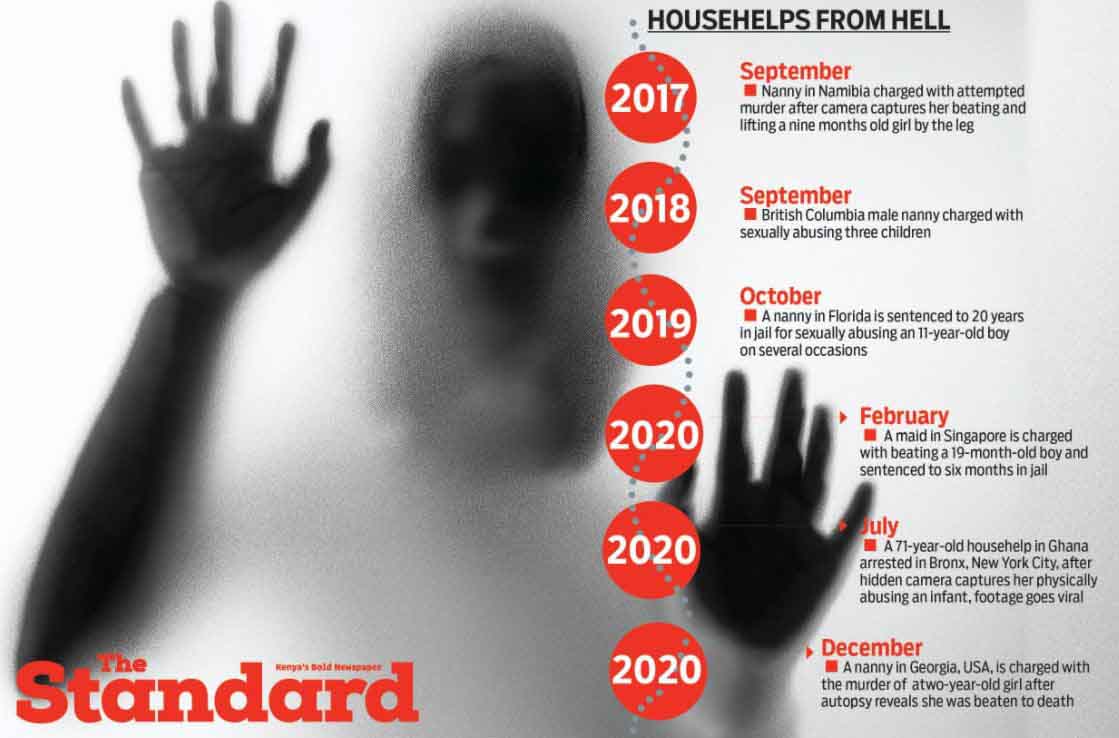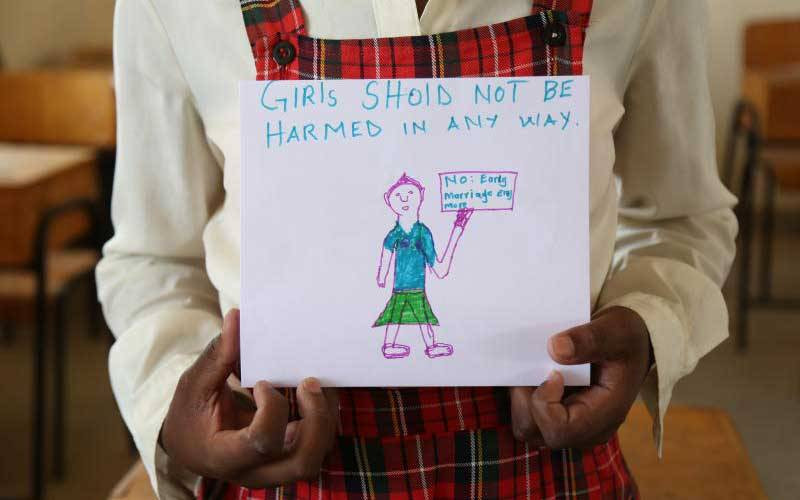
It is always a difficult choice for a mother to leave her child with a stranger. It becomes even harder when that child is a newborn. Yet, more often than not, a mother will be forced to do so as she has to go back to work at the end of her maternity leave. The househelp is then charged with the responsibility of taking care of the baby and the house.
For a mother, having to resume work after delivery is never easy, especially considering the vulnerability of children and the strong bond created between mother and child during the period of maternity. Even worse is the fact that the mother may not have had enough time to know and understand the househelp before leaving the baby in her care. The mother will find parting with the baby every morning so emotional but somehow, with time, she gets used to it, hoping for the best and always looking forward to reuniting with the child in the evening.
Some mothers would prefer devoting their time to taking care of their children. However, one has to work to eat and pay bills or at least supplement their partner’s income for a better life. Hence, raising children, especially in their formative years, has largely become the work of housegirls who, for that reason, have become an important part of the modern family.
However, the emerging trend where househelps are abusing children under their care physically, mentally and even sexually is heart-wrenching. Some of the questions many people are asking in relation to the role of the househelps are; how does one spot the red flags and how do you pick the right caregiver?
The United States’ National Centre for Biotechnology Information (NCBI) emphasises the importance of the early months and years of a child’s life. The experiences the child will have with those around them, parents or househelps, are crucial to the early wiring and pruning that enable the development of the brain. NCBI is part of the National Library of Medicine, a branch of the National Institutes of Health approved and funded by the US government.
“Repeated interactions and communication lead to pathways being laid down that help memories and relationships form, and learning and logic to develop. This means a human baby’s brain is both complicated and vulnerable. If positive experiences do not happen, the pathways needed for normal human experiences may be lost,” reads in part a report by NCBI on the importance of early bonding on the long-term mental health and resilience of children.
The report, Importance of early months on the long-term mental health and resilience of children, says tragic case studies of ‘feral’ children who have survived with minimal human contact illustrate the severe lack of language and emotional development in the absence of love, language and attention.
“Even though babies have a deep genetic predisposition to bond to a loving parent, this can be disrupted if a baby’s parents or caregivers are neglectful and inconsistent. Indeed, longitudinal studies have reported that a child’s ability to form and maintain healthy relationships throughout life may be significantly impaired by having an insecure attachment to a primary caregiver,” says the 2016 report.
And abuse of children, especially at a tender age, has devastating consequences on their emotional and physical well-being.
Kenya has had its share of cases of househelps attacking children left under their care. A heart-wrenching video of a sacked domestic worker who had reportedly stabbed two children with a knife ostensibly to get back at her former employer went viral.
In the video, the family of the affected children was appealing for help to arrest the attacker who was reported to have gone missing after the incident. The victims are aged five and 11.

While this was happening, the boys lay in the hospital, their clothes drenched in blood and their devastated mother beside them.
Three days later, the Directorate of Criminal Investigations (DCI) caught up with the alleged attacker in a bus en route to the Kenya-Uganda border in Busia. There were reports that she had two identity cards and had planned to escape to Uganda.
Stay informed. Subscribe to our newsletter
It was reported that the househelp was unhappy after being shown the door. “Instead of taking the marching orders kindly, she stealthily crept back to her employer’s residence in her absence and assaulted her children to get back at her,” the DCI wrote on its social media handles after the arrest.
The incident left Nairobi’s Donholm estate, where the family lives, reeling in shock. It is said the suspect had worked in the household for two years.
In 2019, a one-year-old girl was assaulted and defiled by a domestic worker at her parent’s home in Bungoma. The mother had left the toddler in the care of a nanny as she pursued her studies at the University of Nairobi. In April that year, the mother would receive a phone call from the police, which shocked her to the core. The police told her that her child had been brought to the police station and later taken to hospital, and that she was in a bad state.
“The maid claimed the child had made a mistake and she got aggravated. In the heat of the moment, she began biting the child,” the mother told reporters.
There were devastating images of the child’s torso full of bite marks. It was reported that other than the bites, the child had burns on her back and was bleeding from her private parts, indicating possible defilement. The househelp was arrested.
In the same year, a housegirl in Taita Taveta County was arrested and charged with sexually assaulting a neighbour’s five-year-old daughter.
The child reportedly complained to her grandmother, while being bathed, that she was feeling pain in her private parts. Upon being pressed to explain what had happened, she revealed she had been abused by the neighbour’s househelp.
The abuser, Ruth Manga, pleaded guilty and was sent to jail. The court heard that the woman assaulted the minor on several occasions between December 2018 and January 2019.
The prosecution told the court that medical evidence from the P3 and Post Rape Care forms showed that the minor was indeed assaulted.
A year before that, a video of a housegirl assaulting a 15-month-old baby went viral, drawing the ire of Kenyans. The video, shared by the baby’s mother Millicent Njeru, had discreetly captured the housegirl pinching, slapping and kicking the minor during feeding time.
“The sight of my baby being abused broke my heart. And when I confronted her, she denied. She claimed it was an accident,” Njeru told The Standard at the time. The video showed the househelp attempting to feed the baby girl, then shoving her to the ground and raining kicks on the baby.
“This is what my one-year-old baby has been going through. We have reported the matter to police,” the mother said then. Young mothers Michelle Wanjiku and Ivy Mugo, from a popular YouTube Channel “Over 25”, weighed in on the matter during an informative 2020 episode dubbed How to manage your nanny.
Mugo is a mother of two-year-old twin girls while Wanjiku has two girls; one is five while the other is an infant.
“During the interview or hiring process, ask the potential housegirl to talk about their last place of work. Getting them to talk about their previous place of work will allow you to gauge their personality. Ask them about the children that were in that home and observe how they talk about them,” said Wanjiku. Mugo said asking them about their schedules in their previous workplaces will allow you to measure how organised they are and how well they plan their time and do their job. The more details they give, the better.
“Once you have hired a housegirl, set expectations and boundaries from the start. If you want things done in a specific way, let that be clear. Develop a consistent duty roster,” said Mugo.
“Further, remember they are human beings; give them the respect they deserve. Never yell at your nanny. The way you treat them may inform the treatment they give your child.”
Made you angry
Wanjiku said: “If the housegirl has made you angry by not doing things the way you want them, let them know but be careful how you do it. Remember you are leaving your child under the care of this person. Also, you may need to find out about the situation at their home and how they are doing. This will let you know where their headspace is at.”
Faith Nafula, a counselling psychologist, told The Standard that the abuse that is meted on children, in most cases, comes from the attacker’s family background. “A househelp who has had a strenuous upbringing may be traumatised and decide that the place to vent their frustrations is the children they are caring for. Yet some problematic tendencies can only be spotted after some time,” said Nafula.
She added: “When interviewing a potential housegirl, look keenly at their attitude. Is the person willing to work? Those who ask questions such as how many children you have and how big the house is, expressing hesitance at the amount of work, is a red flag.”
Nafula said observing their body language while they are already working for you will alert you if there is anything to be concerned about.
“Watch how they talk to you, how they behave with the children, and how they interact with the entire family. Are they friendly? Coldness and detachment towards the children and yourself will tell you something is amiss,” said Nafula. Nafula says some warning signs are a mismatch between the names on the ID and M-Pesa. There should be no questions on the identity of the person you have hired, she said.
“Some housegirls are pretenders. They might be nice to the children when you are around but horrible when you are away. Some even threaten the children about letting you know about their ill-treatment of them and instill real fear in them,” she said.
“Tackle this by getting hints form your children. Be observant and watch how the children behave. Do they appear fearful, withdrawn or secretive? Press them for details of their day and on their interaction with the housegirl.”
[email protected]
 The Standard Group Plc is a
multi-media organization with investments in media platforms spanning newspaper
print operations, television, radio broadcasting, digital and online services. The
Standard Group is recognized as a leading multi-media house in Kenya with a key
influence in matters of national and international interest.
The Standard Group Plc is a
multi-media organization with investments in media platforms spanning newspaper
print operations, television, radio broadcasting, digital and online services. The
Standard Group is recognized as a leading multi-media house in Kenya with a key
influence in matters of national and international interest.
 The Standard Group Plc is a
multi-media organization with investments in media platforms spanning newspaper
print operations, television, radio broadcasting, digital and online services. The
Standard Group is recognized as a leading multi-media house in Kenya with a key
influence in matters of national and international interest.
The Standard Group Plc is a
multi-media organization with investments in media platforms spanning newspaper
print operations, television, radio broadcasting, digital and online services. The
Standard Group is recognized as a leading multi-media house in Kenya with a key
influence in matters of national and international interest.











